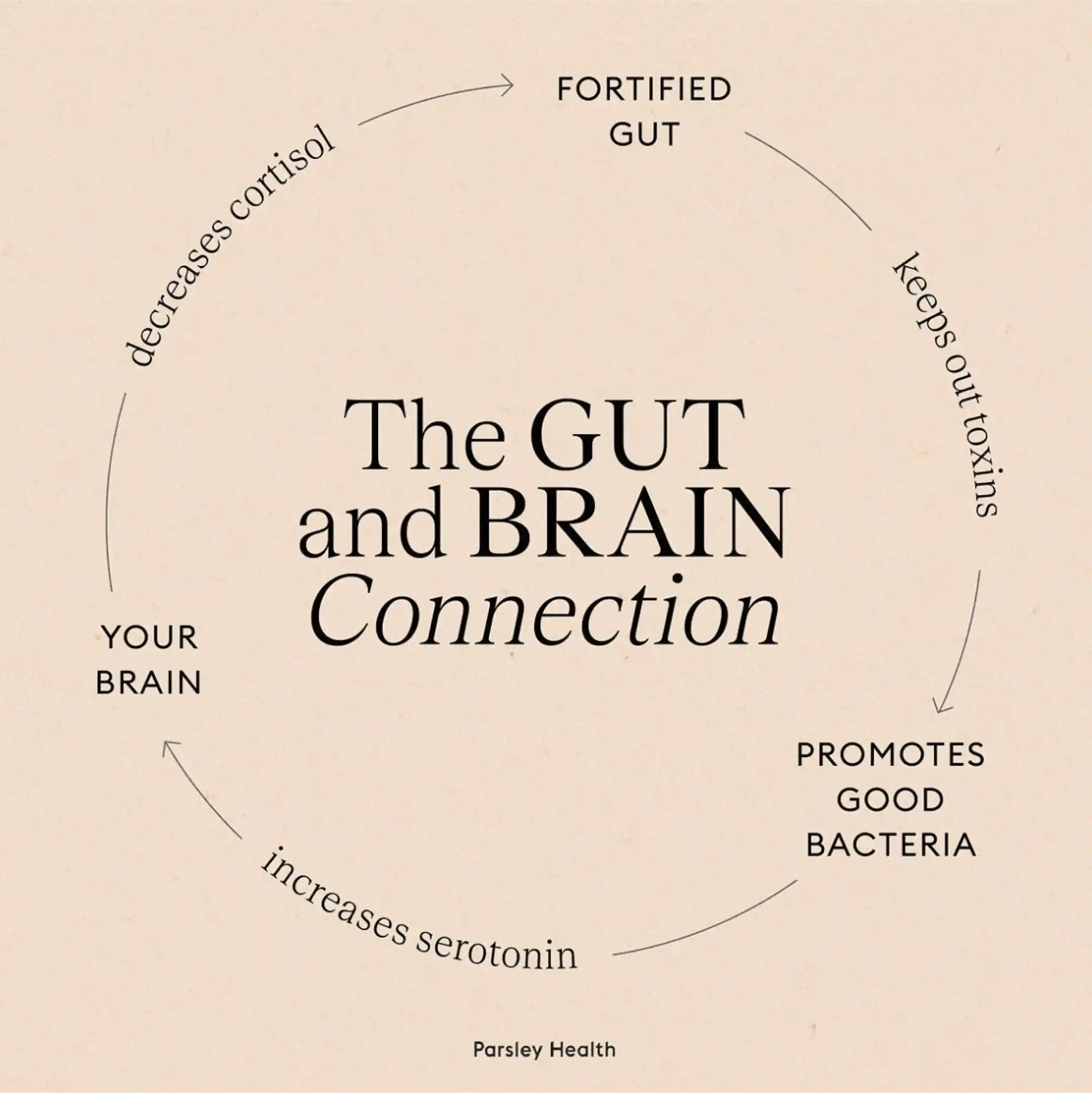This article has been medically reviewed by Nisha Chellam, MD. It contains additional reporting by Angela Myers.
If you suffer from chronic digestive issues such as bloating, pain, constipation, or diarrhea, you might have gut dysbiosis. Read on for everything you need to know about gut dysbiosis symptoms, causes, and treatment options.
What is gut dysbiosis?
“Your gut is home to more than 100 trillion bacteria—and that is a LOT,” says Sarah Steinberg, MD, PhD, a former physician at Parsley Health in New York City. Together, the bacteria and other microbes in your gut make up your gut microbiome. In recent years, we’ve learned a lot about how this microbiome works and how it influences aspects of our health, including not just our digestion but also our immune systems, inflammatory response, and even mental health. “The field of microbiome science has really exploded in the last 10 years,” Dr. Steinberg explains.
“Dysbiosis” is a term used to describe a maladaptation or imbalance inside the body, and a “gut dysbiosis” occurs when there is an imbalance in the number and diversity of your gut microflora. This can impact your health in various ways; in fact, as the authors of a 2018 study wrote: “Studies in animal models and humans have shown that a persistent imbalance of gut’s microbial community, named dysbiosis, relates to inflammatory bowel diseases (IBD), irritable bowel syndrome (IBS), diabetes, obesity, cancer, cardiovascular and central nervous system disorders.”
As you can see, gut health plays a major role in our long-term health and ability to fend off disease.
What causes gut dysbiosis?
As Dr. Steinberg explains, “It seems like every day we’re learning new things about factors that contribute to imbalances in the bacteria in the gut.” According to her, some of the main factors that set people up for gut dysbiosis are:
1. Medications
This includes antibiotics, acid-reducing medications, over-the-counter pain relievers, steroids, and oral contraceptive pills. All these medications, “cause a discreet insult to the gut flora that can lead to dysbiosis,” Dr. Steinberg explains. A 2020 multi-drug metanalysis in Nature Communications found that 18 commonly used drug categories extensively impact the gut microbiome composition, with proton pump inhibitors (PPIs), laxatives, and antibiotics having the largest effect. Each drug has a slightly different effect, causing things like an increase in population of certain harmful bacterias and an increase in fatty acid production. These types of changes are related to multiple health conditions.
2. Diet
According to Dr. Steinberg, “the American diet tends to be higher in bad fats and lower in vegetables, which can negatively impact our gut flora.” Why? Because vegetables provide a lot of the roughage and fiber that allow good bacteria to grow. The standard American diet also contains a lot of carbohydrates, which can allow bad bacteria to overgrow and crowd out the good ones. This can, sadly, cause you to crave more sugar, setting you up to eat more sugar and possibly even develop a blood sugar issue, like pre-diabetes or diabetes.
3. Stress
In case you needed another reason why stress is the most toxic thing in your life, we’re learning more and more about how stress negatively impacts the gut microbes. The authors of a 2018 study wrote that “it is increasingly recognized that stress modulates gut microbiota community structure and activity, and may be one causal factor in dysbiosis.”
Unfortunately, the use of medications, a diet of more processed foods, and a stressful lifestyle are all extremely common for most people, which means many of us are at higher risk of developing a gut microbiome imbalance and dealing with the impacts it can have.
Gut dysbiosis symptoms
Some of the signs that unhealthy stress levels, medications, and a poor diet have impacted your gut microbiome are clear cut; others, not so much. “For the majority of people, the symptoms of dysbiosis are very obvious and include things like include diarrhea, constipation, gas, bloating, belching, and abdominal pain,” says Dr. Steinberg.
 But these aren’t the only symptoms to look out for. According to Steinberg, a microbiome imbalance can also be a contributing factor in harder-to-pin-down issues like sugar cravings and carbohydrate cravings. There are also people with dysbiosis who do not present with digestive symptoms at all. “Instead, dysbiosis may be the root cause of issues like rashes, rosacea, and recurrent hives,” she explains.
But these aren’t the only symptoms to look out for. According to Steinberg, a microbiome imbalance can also be a contributing factor in harder-to-pin-down issues like sugar cravings and carbohydrate cravings. There are also people with dysbiosis who do not present with digestive symptoms at all. “Instead, dysbiosis may be the root cause of issues like rashes, rosacea, and recurrent hives,” she explains.
When left untreated, dysbiosis can contribute to illnesses of all kinds, including anxiety and depression, lupus, MS, leaky gut, and diabetes—just to name a few.
So while dysbiosis isn’t anything to panic about, it is something that you should address. “If left untreated, it can become a root cause of a multitude of different diseases,” says Dr. Steinberg. And many of these diseases also require medications and cause stress, which makes dysbiosis worse. “It becomes a matter of imbalanced gut flora propagating the risk factors that caused it,” she continues. That’s why it’s important to get early gut dysbiosis treatment and support your gut health.
Diagnosing gut dysbiosis
If you suspect that you have gut dysbiosis, give a primary care doctor a call. They can order the proper tests and lab samples, help interpret the results, and create a treatment plan.
Typically, they will order blood tests to diagnose gut dysbiosis. Other times, they will order a comprehensive digestive stool analysis that will be tested in a lab. The latter may make it easier to assess the gut microbiotas. In some cases, a gut dysbiosis diagnosis may be possible with a breath test, though this isn't as common.
Healing gut dysbiosis
Parsley Health takes a holistic, personalized point of view in treating dysbiosis and improving gut health. Typically, this means creating a treatment plan tailored to the individual patient based on their symptoms and lifestyle. But according to Dr. Steinberg, when it comes to dysbiosis, many of those treatment plans have the following things in common:
1. Decreasing sugar and carbohydrates
“One thing that has always been very clear is that glucose transport is a huge mediator of dysbiosis,” says Dr. Steinberg. In other words, the amount of sugar you’re consuming has a tremendous negative impact on your gut flora. The good news is that by shifting gut flora to a healthier balance, your cravings for sugar will decrease because your gut will start to favor healthier bacteria over the unhealthy, sugar-eating ones.
2. Increasing fiber intake
Fiber is another big piece of the healthy gut puzzle. That’s because fiber is a source of prebiotics, which is essentially the food that healthy gut bacteria like to eat. According to Dr. Steinberg, the goal when it comes to consuming fiber is diversity. “We often get stuck in a rut in terms of what we eat. When we approach gut healing, we want to aim to create a diverse ecosystem,” she says.
She recommends eating diverse vegetables that provide all different types of roughage. “Inulin powder is also a great prebiotic supplement to add to your routine to feed beneficial bacteria,” she continues.
3. Getting serious about stress relief
If you want to heal dysbiosis in the gut, getting stress under control is critical. “I’m a big believer in meditation and I’ve been practicing yoga for over 25 years,” says Dr. Steinberg. That said, any kind of mindfulness exercise will do the trick. “Each person has to find their own access point,” she says, “Some people need to tire themselves out with a sweaty yoga class; others like to do balance exercises.”
 The key is to get out of your head and into your body. “All these exercises bring all the activity in your brain out of the frontal lobe (the part of the brain that regulates decision making, judgment, and memory) and into the cerebellum (the part of the brain that regulates muscle movement),” says Dr. Steinberg.
The key is to get out of your head and into your body. “All these exercises bring all the activity in your brain out of the frontal lobe (the part of the brain that regulates decision making, judgment, and memory) and into the cerebellum (the part of the brain that regulates muscle movement),” says Dr. Steinberg.
4. Improving sleep quality
Last but not least, sleep is a crucial part of healing gut dysbiosis. This may seem strange at first. What does sleeping have to do with the bacteria in your gut? Well, research shows that sleep and gut bacteria are actually intricately connected. For example, a 2023 study suggest sleep deprivation may be a direct cause of gut dysbiosis.
To improve your sleep without drugs, Dr. Steinberg recommends getting sunshine and fresh air first thing in the morning, “I’m a huge believer in getting sunlight to reset circadian rhythm,” she says.
Frequently Asked Questions
How do I know if I have dysbiosis?
If you suspect that you have gut dysbiosis, it's best to give a primary care doctor trained in functional medicine a call. They can order the proper tests and lab samples, help interpret the results, and create a treatment plan.
How do you fix gut dysbiosis?
Often, the most successful gut dysbiosis fix is tailored to an individual's lifestyle and symptoms. However, many treatment plans involve increasing fiber intake, improving sleep quality, eliminating sugars and carbohydrates, and finding ways to relieve stress.
What triggers gut dysbiosis?
Gut dysbiosis is usually triggered by medications or certain lifestyle choices, such as eating a diet high in carbohydrates and sugar or not getting enough sleep (7-9 hours a night for most of us). More and more evidence points to stress' role in triggering gut dysbiosis too.
What are the symptoms of bad gut bacteria?
Bad gut bacteria can have far reaching symptoms. The most obvious include gas, bloating, belching, diarrhea, constipation, and abdominal pain. If left untreated, bad gut bacteria can impact the body in other ways, including lupus, MS, leaky gut, and mental health conditions like anxiety or depression.
At the end of the day, having a healthy gut really is the secret to great overall health. The good news is that even if you are currently dealing with gut dysbiosis, making a few targeted lifestyle changes can help you get your gut—and the rest of your body—back on track.
Ready to live a longer, healthier life? Start by taking the Parsley Symptom Index quiz to get your symptom score.

